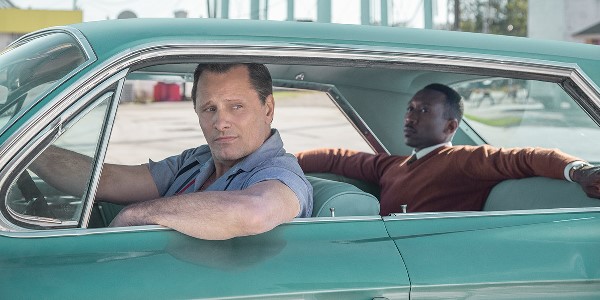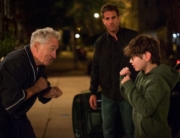For one reason or another, 2018 may be the year of the critically acclaimed though problematic award winner, first with ROMA and now Green Book.
Months ago, the buddy/road trip dramedy Green Book won the audience favorite award at the Toronto International Film Festival. Oscar pundits have already named it a frontrunner in this season’s awards race, and it does come very well packaged, with stars Mahershala Ali and Viggo Mortensen. It’s also a change of pace for director Peter Farrelly (Dumb and Dumber), of all people, to take on a civil rights–centered story.
Inspired by a true story, according to the opening credits, the new film has been compared to the Oscar-winning Driving Miss Daisy (1989) for obvious reasons, although it’s not a glib conclusion, considering that it, too, could have been made at any time since the 1980s. One can also imagine the likes of Stanley Kramer making it during the ’50s and ’60s, though perhaps without the derogatory language. In fact, it’s more upfront about heated racial tensions and bigotry than Daisy, which might be the major difference between the two movies besides the ethnicity of the driver at the wheel. In this case, it’s a white character shepherding an erudite black pianist from the north on a tour of the Deep South of 1962, three years before the passage of the Civil Rights Act.
Given the dynamics of this two-hander, it’s a bit weird that the entry point for the audience—and really the movie’s central character—is the white Italian-American, working-class Tony “Lip” Vallelonga (Mortensen), whose eyes are opened through the humiliations and abuse of the black musician. Tony is hired as pianist Don Shirley’s valet and personal assistant for eight weeks on the road because of the scrappy family man’s reputation: he’s a fighter. Don has heard through the grapevine that the hot-headed and impulsive Tony would make an effective go-to bouncer of sorts, and the narrative gives Tony plenty of opportunities to earn his keep as Don’s protector.
Near the beginning, Tony’s wife, Dolores (Linda Cardellini in a one-note good wife role), serves refreshments to two black repairmen who are paying a house call. When she’s not looking and after the men have left, Tony throws the two glasses that the repairers have drank from into the trash. Tony also refers to Don as “king of the jungle bunnies” to his wife after his first interview with his new employer, so it’s safe to say that he has a bit of a learning curve ahead of him. To prepare his driver for the journey, Don gives Tony a copy of The Negro Motorist Green Book, the guide to where African Americans can stay and dine in the South, or, as the book cover says, “for vacation without aggravation.”
The script sets up the two men as a comedic study of contrasts: Tony lives in the Bronx with his three kids and a very large, boisterous extended family, while Don lives in a palatial studio above Carnegie Hall. Tony gesticulates, talks while he’s eating, and doesn’t pick up social cues. Think Archie Bunker, without any subtlety whatsoever. He also doesn’t like to be told what to do, even when politely asked by Don to be less chatty—there is no quiet time for Don or the audience while Tony is around. By contrast, Don observes, chooses his words carefully, and thinks before he acts.
The movie comes off as old-fashioned compared to the crop of the last few months, which includes The Hate U Give and BlacKkKlansman, which feature black main characters leading fights against racism. That’s not to say Green Book isn’t enjoyable or even a romp. Feeling much shorter than its 130-minute length, it moves at a steady pace, hopping from one episode to another in which the duo confronts bigotry played out in various forms. Some of it is condescension; others times it’s all-out discrimination. When Don performs for a private home outside of Raleigh, North Carolina, he is not allowed to use the restroom in the house and is directed toward the outhouse in the field. He chooses to be driven back to his hotel. However, what is likely to produce a few groans is a getting-to-know-you scene in which Tony introduces the dapper Don to R&B music by such artists as Aretha Franklin and Chubby Checkers playing on the radio, as if a pianist who has spent years training and performing wouldn’t be aware of other musical influences.
Farrelly directs with the touch of a sledgehammer—there are few reaction shots that the audience cannot see coming—and this is particularly true regarding Mortensen’s performance. For the part of Tony, the actor gained 45 pounds in a role that is a stretch for him. He almost obliterates memories of his subtle and moving performances in Captain Fantastic or Far from Men, coming off as another actor altogether here. Perhaps no other performer has put so much effort into a performance this year. However, the audience is always aware that it’s acting.
Yet the role of the Jamaican-born Don Shirley is by far the more compelling and complex figure, a singular individual deserving of his own biopic. A classically trained pianist (in Leningrad), he had a recording career that began in the 1950s and was an accomplished performer in many musical genres. In a script that leaves no message unuttered, he at one point bemoans how he is not considered black enough by blacks or white enough by whites. Additionally, he deliberately chooses to go on a tour of Jim Crow South, knowing what lies ahead.
With his graceful movements (watch how Ali expresses with his hands), Don is refined, impeccably dressed, and straight out of a Noël Coward play. Dignity wins out, and if the film works at all, it’s because of Ali’s layered, unforced acting. It’s through Don’s observations that viewers begin to have a different view of Tony. If Don can accept and warm up to Tony—who he’s stuck with in an enclosed space for hours on end, after all—so can viewers.







Leave A Comment